Why You Need To Pay Attention To The 2020 City Council Election

“Good intentions may do as much harm as malevolence if they lack understanding.”
—Albert Camus

The 2020 City Council election is this November. The challenges facing Ventura are so crucial that they will shape the city for decades.
Who the candidates will be for the Council in this election will likely be unknown until July. The nomination period opens July 13th and closes August 5th.
Our city is no longer the small seaside community to the north of the LA basin. We are a growing community with all of the problems larger cities face. We need qualified representatives to confront and solve those problems. Candidates must have previous community involvement, education, experience and willingness to explore alternatives different from the sclerotic thinking and mistakes of the past.
Water Will Dominate The 2020 City Council Election
Every candidate will acknowledge that water is a concern for Ventura. The specifics on how to address the issue will vary, but how can you judge what they know? Here is what you should focus on.
Wishtoyo Consent Decree Compliance
 Candidates for the 2020 City Council election must concentrate on the Wishtoyo Consent Decree, and the impact of the decree in the next decade. That Federal Decree requires Ventura to stop putting a majority of its treated wastewater into the Santa Clara River estuary, beginning in January 2025 through 2030. To do so will be an enormous cost to the city.
Candidates for the 2020 City Council election must concentrate on the Wishtoyo Consent Decree, and the impact of the decree in the next decade. That Federal Decree requires Ventura to stop putting a majority of its treated wastewater into the Santa Clara River estuary, beginning in January 2025 through 2030. To do so will be an enormous cost to the city.
We have advocated that the city must request a modification to the Wishtoyo Consent Decree to extend the deadline for depositing wastewater into the estuary.
VenturaWaterPure
 Ventura Water has confused the City Council by combining two different ideas to falsely heighten the urgency to drink wastewater. In 2011, Venturans were told, “We are short of water.” Ventura Water proposed treating the wastewater we currently dump into the Santa Clara River into potable water at the cost of $1 Billion. They call the project VenturaWaterPure.
Ventura Water has confused the City Council by combining two different ideas to falsely heighten the urgency to drink wastewater. In 2011, Venturans were told, “We are short of water.” Ventura Water proposed treating the wastewater we currently dump into the Santa Clara River into potable water at the cost of $1 Billion. They call the project VenturaWaterPure.
All candidates should remember $1 Billion is a large bet to place with the taxpayer and ratepayer money. Will the candidates know that directly drinking treated water from the treatment plant is not approved and is not safe? Do they know the details of injecting that treated water into the groundwater then pumping it back through a filtration facility? Do they know there are less expensive ways to divert that water from the estuary?
Looming Water Rate Increases
 Ventura Water will undoubtedly request a water rate increase from this next City Council. They will claim the money is for VenturaWaterPure or to improve the city’s water infrastructure. Water rates already went up by $220 million with water and wastewater increases in 2012-13. Any Councilmember and any candidate for City Council should be able to explain how Ventura Water spent the $220 million and why another rate hike is needed.
Ventura Water will undoubtedly request a water rate increase from this next City Council. They will claim the money is for VenturaWaterPure or to improve the city’s water infrastructure. Water rates already went up by $220 million with water and wastewater increases in 2012-13. Any Councilmember and any candidate for City Council should be able to explain how Ventura Water spent the $220 million and why another rate hike is needed.
Ventura River Cross-Complaint
In 2014, Santa Barbara Channelkeeper filed a lawsuit alleging Ventura was taking too much water from the river, hurting habitat for wildlife. The city is not the only water user in the Ventura River and Ojai valley. So Ventura asked the court for a cross-complaint to allocate the burden of water sharing among the potential 14,000-plus property owners in the Ventura River watershed. Understanding this pending lawsuit is essential to the voters. The next City Council could approve spending another $4.4 million for legal expenses. Keep in mind that money is equal to the budgetary loss for the 2020-2021 General Fund. Any legal fees come out of the General Fund at the expense of public safety and street repairs.
Homelessness Will Be A Popular Issue In The 2020 City Council Election
Housing Ventura’s homeless is a high priority for the city. Most believe that affordable housing is the solution. As a bridge to permanent housing, Ventura’s homeless shelter, ARCH, is critical.
 Ventura has 555 homeless people, according to the 2019 Point-in-Time count. Meredith Hart, Director of Ventura’s Safe & Clean program, believes the 2020 count will be higher. Ventura spends on its homeless are between $3.89-$4.59M per year.
Ventura has 555 homeless people, according to the 2019 Point-in-Time count. Meredith Hart, Director of Ventura’s Safe & Clean program, believes the 2020 count will be higher. Ventura spends on its homeless are between $3.89-$4.59M per year.
All candidates must have a solution to homelessness, and they must not be afraid to challenge how and how much we are spending on the issue. The ARCH opened in February 2020, so we must allow time for it to impact the community. Yet, Councilmembers must be courageous enough to act quickly if the results are not favorable.
Candidates should also differentiate between the various types of people living on the street. Many of the homeless are “service-resistant,” meaning they will not agree to help regardless of the circumstances. The majority of the homeless are substance abusers or mentally ill. Others are vagrants. The city must have different plans to treat those genuinely needing help from the vagrants.
Budget Deficits For The Entire Term
Budget deficits will plague the new City Councilmembers throughout their entire four-year term. Knowing why the budget is running in the ‘red’ should be a significant consideration for every new city employee hired and every contract the City Council approves in the next four years.
The city staff projects a “most likely” budget scenario for 2020-2021 that will have a shortfall of $4.1M. It does not improve in the following ten years either. So the City Council must weigh the alternatives for cutting different city services.
Pensions Are A Political Third Rail
Pensions are the ticking time bomb nobody wants to discuss. They’re the political third rail issue that candidates ignore. Next year, the CalPERS payments will balloon by $2 million. That’s after a $2 million increase this year.
Pension obligations feed budget deficits. As pension obligations grow, it takes away money that would otherwise pay for essential city services.
Pensions will consume the Measure O tax increase by 2023. Any earnest candidate should demand city staff forecast the anticipated CalPERS increases objectively. Provide the Council with the necessary information to make financial decisions.
Voting By Districts In The 2020 City Council Election
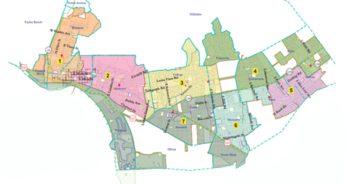
Districts 2, 3 and 7 are competing in the 2020 City Council election.
The 2020 City Council election will culminate the switch from electing Councilmembers at-large to voting by districts—a process that began in 2018. The first round of district elections gave us inexperienced new Councilmembers to lead the city.
This election, voters will select Councilmembers in Districts 2, 3 and 7. Voters elected Christy Weir and Cheryl Heitmann as Councilmembers at-large, but they will now compete in Districts 2 and 7, respectively, if they choose to run again. District 3 will be an open seat as Councilmember Matt LaVere vacates his role to run for County Supervisor.
The city experienced growing problems with district governance when the demands about traffic, housing, crime and services of the districts do not mesh with the other districts’ views.
Campaign Finances
The 2018 City Council election was the costliest in the city’s history. The candidates raised a record amount of money.
A lot of that campaign money came from Political Action Committees (PACs). In 2018, the three largest PACs—Chamber of Commerce, Fire and Police—contributed $79,717 to candidates. Those PACs consider it money well spent if it buys them access to the elected candidates.
Voters should note the influence the PACs have over the 2020 City Council election. Pay attention to who contributes to the candidates, and what those PACs ask in return for their support.
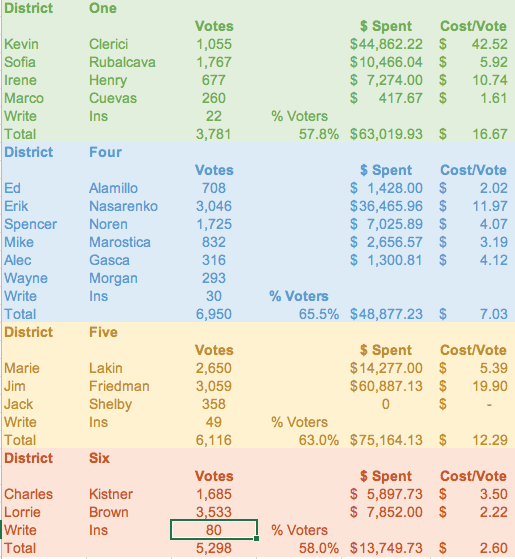
2018 City Council election contributions
Growth As An Issue In The 2020 City Council election

Growth means different things to different people. It’s inescapable that Ventura needs to grow. Everyone agrees that we need affordable housing.
This year’s candidates need to acknowledge that growth and water availability are inseparable. They also need to recognize the opposition to more houses (the NIMBYs) by some in the community. Forward progress on growth means accommodating, integrating and compromise.
Every candidate must have some ideas on growth as part of his or her platform.
Editors Comments

Many complex issues face Ventura. All 2020 City Council election candidates need to be aware of the problems and have a plan to address them. We can’t rely on the candidates alone to be knowledgeable. It’s each person’s responsibility to be aware of the challenges before us. It’s equally important that each voter be confident that the candidates understand them. Only then do our elected officials represent us.
Keep these points in mind as you go to the polls in November.
Make Certain All Councilmembers Can Address These Issues Adequately.
Below you’ll find the photos of our current City Council. Click on any Councilmember’s photo and you’ll open your email program ready to write directly to that Councilmember.
 |
 |
|
 |
 |
|
 |
 |
|
 |
For more information like this, subscribe to our newsletter, Res Publica. Click here to enter your name and email address.





 Today’s Council is still operating on the 2019-2020 budget that shows everything is fine. In six months we will be in a new budget cycle, how does that look? The city staff projects a “most likely” budget scenario that will have a shortfall of $4.1M. How can the seven members of the City Council take action to save jobs and essential services for the citizens of Ventura?
Today’s Council is still operating on the 2019-2020 budget that shows everything is fine. In six months we will be in a new budget cycle, how does that look? The city staff projects a “most likely” budget scenario that will have a shortfall of $4.1M. How can the seven members of the City Council take action to save jobs and essential services for the citizens of Ventura?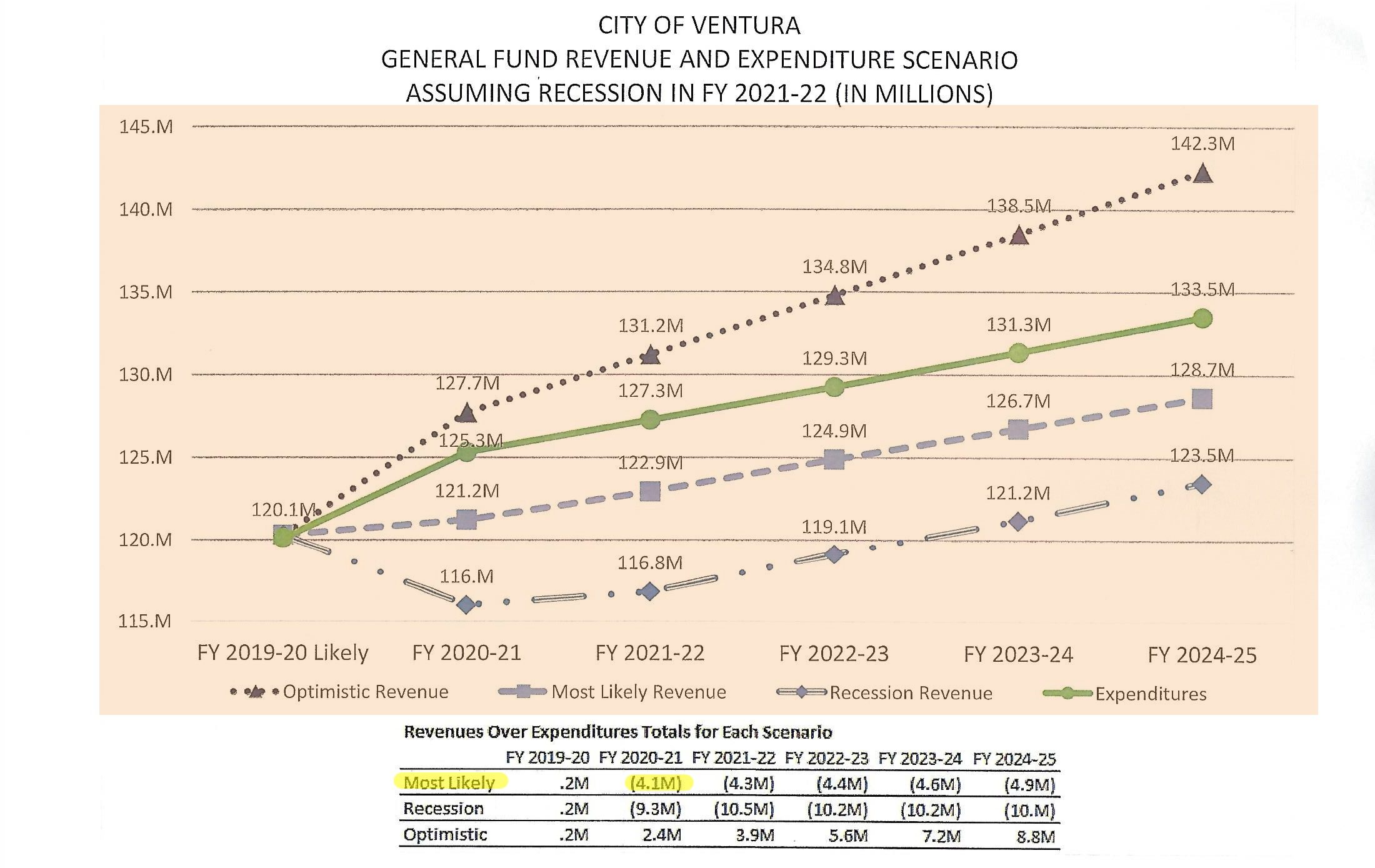
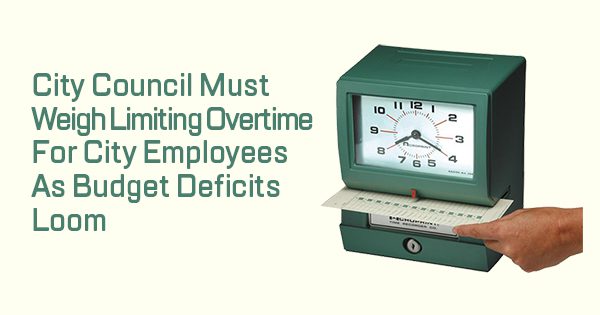 Reduce overtime for city employees. The largest single expense category in the city is staff salaries and benefits. Reducing overtime might save as much as $5.6 million in the budget.
Reduce overtime for city employees. The largest single expense category in the city is staff salaries and benefits. Reducing overtime might save as much as $5.6 million in the budget.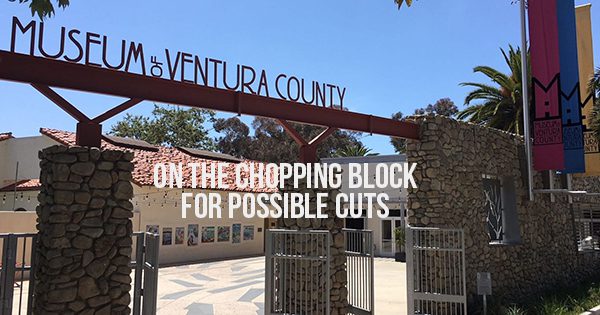 Review the money Ventura pays to support the Ventura County Museum. This option will save $250,000 per year.
Review the money Ventura pays to support the Ventura County Museum. This option will save $250,000 per year.  Evaluate Community Granting Programs. The amount of potential savings is not listed. This category includes programs like Community Access Partners (CAPS). CAPS received
Evaluate Community Granting Programs. The amount of potential savings is not listed. This category includes programs like Community Access Partners (CAPS). CAPS received